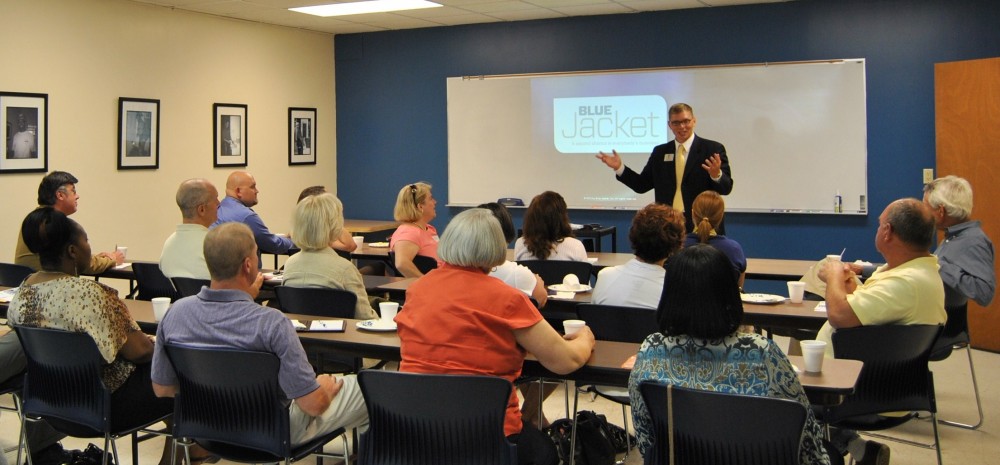August 6, 2014, FORT WAYNE, INDIANA— The nine-year old Blue Jacket, Inc., a Fort Wayne-based nonprofit, had only 9% of its graduates with criminal backgrounds return to crime and a 66% employment rate within three months of graduating the 4-week training.
For Blue Jacket, recidivism is defined as those that return to prison for any technical violation (not necessarily committing a new crime but violating a Parole or Probation Order) or those that are convicted of a crime within one year of graduating the Career Academy training. Together, the total recidivism rate is 17%, a 9% return to crime and 8% return to prison. The organization was expecting a total 31% recidivism rate. These numbers are incomparable to any local or regional entity serving ex-offenders.
In a recent study backed by the US Department of Justice, Indiana’s prison population will jump by at least 20 percent over the next three years and more low risk offenders are returning to prison than ever before. Employment is one of the best predictors of success or failure for released inmates. “We do not screen anyone out for entry into our program which means that we often work with the hardest-of-the-hardest to employ. These outcomes are a testament to the intense and empowering training that Blue Jacket provides,” explains Tony Hudson, Executive Director of Blue Jacket.
Blue Jacket was created to provide the tools and opportunities to adult ex-offenders and other disadvantaged people to become productive members of society. Blue Jacket serves homeless, veteran, low-income, and anyone with a hardship to employment but has specialized in serving people with criminal backgrounds.
Blue Jacket’s employment rate holds steady averaging 63% within three months. In 2013, Blue Jacket achieved a 66% employment rate for all graduates both ex-offender and non-offender, despite the economic crisis. Furthermore, it was found that in challenging employment markets, more people asked for the program than in better employment markets and job placements increased during that time.
According to a US Department of Health and Human Services-backed study of a multi-site national study of programs like Blue Jacket who serve the “hard-to-employ,” they found that those agencies more positively impacted recidivism for the more disadvantaged and higher risk. With this recent statistic, it is estimated that it will not increase beyond 16% for returns to prison within two years. To compare apples to apples, according to the Indiana Department of Corrections, 42% of Allen County ex-inmates from 2009 returned to prison within two years.
Blue Jacket’s area of focus is job training and job placement while partnering with over 30 local agencies and 40 local employers to carry out its mission, largely with partner Community Action of Northeast Indiana (CANI). Blue Jacket’s in-house job development entity, Opportunity Staffing, is not reliant upon grants but on the support of employers that hire Blue Jacket’s graduates, which is a testament to its innovating training and screening process. For someone working hard to prove their worth to an employer, Opportunity Staffing is the conduit for trust to be built. In 2012, The Blue Jacket Clothing Co. was launched to sell donated business professional clothes so that Blue Jacket can employ only Blue Jacket graduates in the store and yet give clothes at no charge to its students in the 4-week training.
“At a time when we are being required to do more with less and the state is releasing more felons back into our community, the success of Blue Jacket enables us to better manage our scarce criminal justice resources,” says Allen County Commissioner Nelson Peters. “When new skills are gained, economic potential increases. Blue Jacket gives hope to those who desire to become productive again.”
Blue Jacket launched a “$30 will give one day of training” campaign soliciting donations from people from the community. For more information, visit www.bluejacketinc.org or find us on Facebook.
